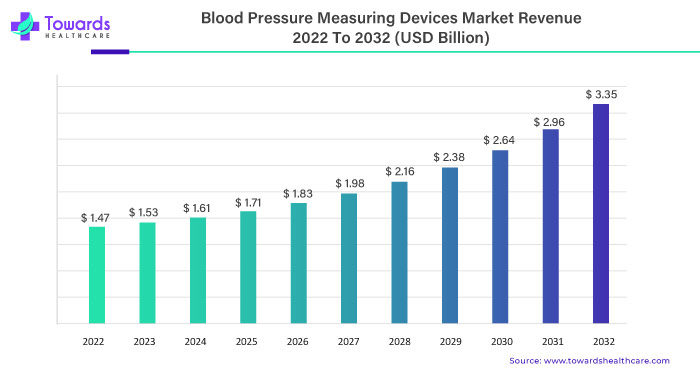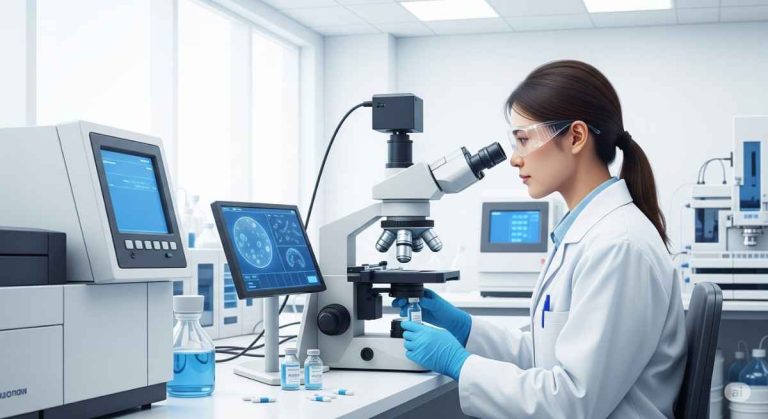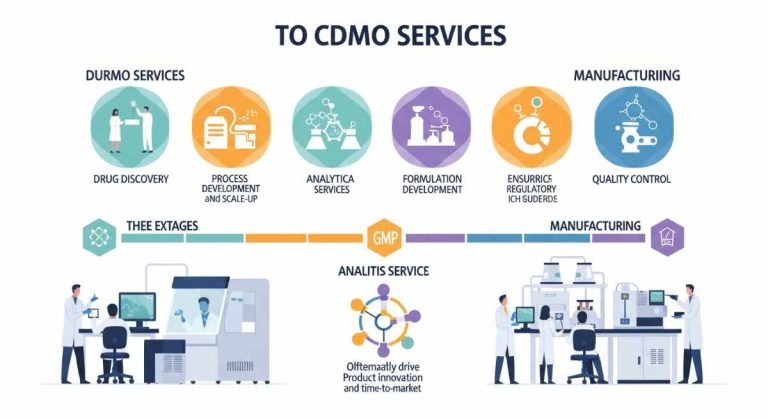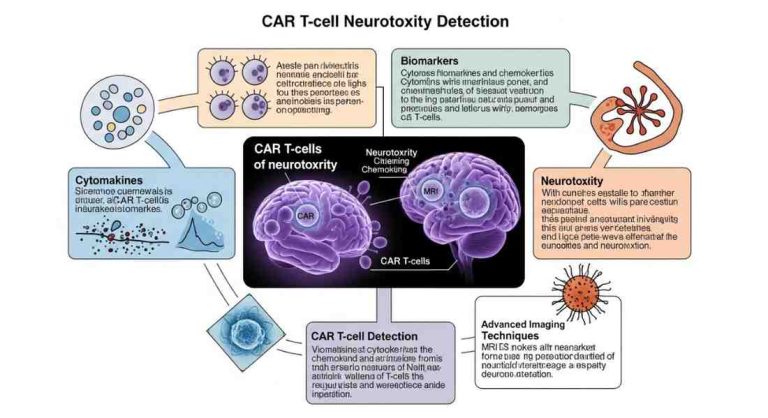Global Blood Pressure Monitoring Devices Market Growth, Trends and Key Players (2023 – 2032)
The global market for blood pressure monitoring devices was valued at USD 1.47 billion in 2022 and is projected to reach USD 3.35 billion by 2032. This represents a compound annual growth rate (CAGR) of 9.1% from 2023 to 2032.

Download statistics of this report @ https://www.towardshealthcare.com/download-statistics/5001
Hypertension Awareness and the Demand for Blood Pressure Monitoring Devices
According to the World Health Organization (WHO), around 1.28 billion adults between the ages of 30 and 79 are affected by hypertension. However, only 42% of these individuals are properly diagnosed and treated, leaving the majority unaware of their condition. Most of these undiagnosed cases are found in low to middle-income countries. Despite this, growing awareness about the health risks associated with hypertension is expected to drive increased demand for blood pressure monitoring devices.
Impact of COVID-19 on the Blood Pressure Monitoring Devices Market
In 2019, blood pressure monitors were in high demand in regions like China, Europe, and Asia. However, demand in North America fell due to trade tensions between the US and China, and Japan saw a decline due to a consumption tax hike and other factors. The global market was also affected in the fourth quarter by the onset of COVID-19.
In 2020, the pandemic increased the global demand for blood pressure monitors and thermometers as health management became even more crucial. With restrictions on non-essential movement, online sales channels saw significant growth.
COVID-19 also accelerated the adoption of telemedicine worldwide, as patients with chronic conditions like hypertension, diabetes, and others had to avoid hospital visits to reduce the risk of exposure. As a result, these patients needed alternative ways to manage their health remotely.
To address this, OMRON has developed a remote patient monitoring service that allows patients to measure their vital signs at home using devices like blood pressure monitors, ECG monitors, and body composition scales. The data is then shared with doctors and nurses, allowing patients to receive advice and care without leaving their homes or visiting a hospital. This innovative approach to telemedicine is helping to meet the needs of patients in the “new normal” created by the pandemic.
Remote Patient Monitoring (RPM) and Hypertension Care
In August 2020, OMRON introduced its VitalSight™ remote patient monitoring system at Mount Sinai Hospital in New York, one of North America’s top medical institutions. Through this system, patients with high blood pressure can use the “OMRON connect” health management app or a specialized communications hub to send their daily blood pressure readings and body composition data directly to the hospital’s electronic medical records (EMR). This allows doctors and nurses to communicate easily about the patient’s condition.
This RPM approach enables healthcare providers to monitor patients’ daily health and adjust treatment plans more effectively. It also allows patients to stay in regular contact with their doctors, which encourages them to take an active role in managing their health and improves treatment adherence. As part of its strategy to expand its data services, OMRON is working to offer more RPM-based hypertension treatment options in North America, where nearly half of the population has high blood pressure.
Online Hypertension Consultation Service in Japan
In Japan, online consultations are seen as a complement to in-person visits. Currently, only about 12 million of the 43 million people with high blood pressure are effectively managing their condition, while around 29% are on medication but not getting their blood pressure properly controlled. Another 11% (4.5 million) are aware of their hypertension but not seeking treatment, and 33% (14 million) don’t even know they have it.
One major barrier to treatment is that hospital visits can be difficult for elderly patients, while busy individuals often lack the time for clinic appointments. To address these issues, OMRON launched “telemedEASE BPTM” in May 2019, an online hypertension consultation service developed in partnership with the telemedEASE association. This service allows patients to manage their hypertension from home or work, including monitoring their blood pressure, making appointments, receiving diagnoses and prescriptions, getting medication, and even paying bills. The COVID-19 pandemic has further accelerated the acceptance of telemedicine in Japan, with hopes for regulatory changes to support its continued growth.
Growing Senior Population and Blood Pressure Concerns
As life expectancy increases and fertility rates decline, the global population is aging. By 2020, there were 727 million people aged 65 or older. In the next 30 years, this number is expected to more than double, reaching 1.5 billion by 2050. As a result, the percentage of the global population aged 65 and over will rise from 9.3% in 2020 to about 16% by 2050.
While it was once believed that high blood pressure was simply a natural part of aging, we now know that the causes of blood pressure changes with age are more complex. Aging increases the likelihood that environmental or lifestyle factors will contribute to high blood pressure, but it is not inevitable.
Access exclusive insight now @ https://www.towardshealthcare.com/price/5001
port you. Please feel free to contact us at sales@towardshealthcare.com
Web: https://www.towardshealthcare.com
Visit Dental Specifics: https://www.towardsdental.com
Get the latest insights on industry segmentation with our Annual Membership: Get a Subscription
For Latest Update Follow Us: https://www.linkedin.com/company/towards-healthcare



